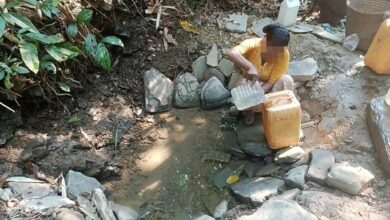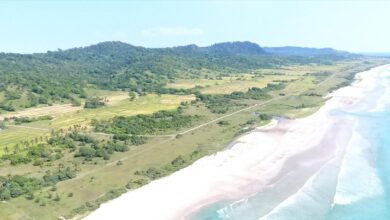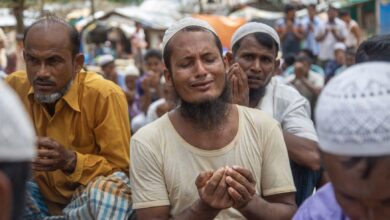
On June 9, a group of around 70 young people armed with handmade hunting rifles kept watch all night over a road on the outskirts of Thantlang, a town in Chin State about 25 miles from the capital Hakha.
One of them was Salai, a 24-year-old ethnic Chin man who had given up a comfortable job in the city to join the Chinland Defence Force (CDF), a resistance group formed in the wake of the February 1 coup.
Together with his comrades, many of whom had also left behind easier lives to spend their days and nights in the jungle, enduring leeches and other hardships, he was waiting silently in the rain for the enemy to appear.
Finally, at around 9am, a platoon of 27 regime soldiers entered the area. Armed with assault rifles, mortars, and machine guns, they immediately started firing when a mine that had been laid by the CDF as part of their ambush plan went off.
Despite being vastly outgunned, the semi-civilian CDF fighters succeeded in their mission: 24 of the junta troops had been killed, and only three escaped.
This was more than the 17 dead that the CDF later announced, Salai said, but he wasn’t complaining. He was satisfied that he and his fellow resistance fighters had defeated a much better-armed enemy without losing a single member of their own group. He knew the outcome could have been much worse.
“An artillery shell dropped next to me. I wasn’t hurt because it didn’t explode. I was lucky,” he said.
From journalist to guerrilla
“Salai” is not his real name, but it’s what his Burmese friends call him. In his native language, “Salai” is an honorific added to men’s names. “Ko Salai” was easier to remember than his full Chin name, so it stuck.
Salai didn’t imagine when he was studying at a Christian theological college after graduating from high school that he would one day find himself fighting in the jungle.
He came of age at an exciting time for the country, when it had opened up and was experiencing unprecedented freedoms after half a century of oppressive military rule. His dream in those days was to become a journalist.
“I’ve been interested in journalism since I was young. I started writing news articles in 2015, when I was still a student,” he recalled proudly.
As an aspiring journalist, Salai had numerous opportunities over the next few years. Despite its small size, Chin State saw the emergence of many online news outlets as Internet access improved. Every town and city in the state had journalists plying their trade.
But all that changed on February 1, when the military seized power and erased a decade of progress literally overnight.
All at once, journalists became the enemy of the new order that the coup makers were trying to establish. When Salai and some of his colleagues were tipped off that charges of incitement had been laid against them for their coverage of anti-coup protests, they decided to flee.
With the help of police officers who didn’t support the military takeover, they managed to escape. And like many others disgusted by the military’s brutal crackdowns on protesters, Salai joined the armed resistance.
Secretly, he made his way to the Chin-India border, where he received military training from the Chin National Front (CNF), an armed group formed during the pro-democracy uprising in 1988. Young people from all over Chin State, as well as some from Sagaing and Magway regions, took part in the training.

At first, they had the usual problems—quarrels among trainees and difficulty adjusting to a new and demanding lifestyle. Accustomed to having a selection of their favourite foods available to them in the city, they were now sometimes forced to eat uncooked rice, fish and meat.
By July, however, more than 4,000 had completed training, according to CNF spokesperson Salai Htet Ni. Among them were a few outstanding trainees who were assigned by their superiors to lead their own companies. Salai was one of them.
‘We have to win’
The target of Salai’s first assignment was a group of soldiers stationed next to a branch of the military-owned Innwa bank near the state parliament in Hakha. However, when he and a few of his comrades arrived there on May 2, they found the area had been cordoned off by around 100 soldiers.
Apparently, someone had tipped off the authorities about their plan. According to Salai, the group only managed to escape thanks to some police who pretended not to see them.
“It was an unforgettable day. We were almost killed. Even if they didn’t kill us, they would have arrested us. But we all got out alive, by the grace of God,” he said.
Even though they were forced to abandon their first mission, they later returned to the same place to try again. This time, they killed three soldiers.
They soon grew accustomed to carrying out such attacks. They moved around the state, travelling 20 to 40 miles a day, joining clashes on the frontline in northern townships such as Thantlang and Falam.
“We camped in the jungle, rain or shine. Sometimes, we had to sleep surrounded by cow dung,” Salai laughed.
“We slept in trees and sometimes even fell asleep in streams. We ate if the villagers fed us, and went without if they didn’t. But usually, the villagers would give us food,” he added.
It wasn’t difficult to find help, he said, because the Chin people don’t like the military regime. On one occasion, Salai said, he narrowly escaped capture when local residents hid him from soldiers looking for guerrillas in their neighbourhood.

The recent defeat of well-equipped but dispirited international forces in Afghanistan has convinced many CDF fighters that they can win against the junta by engaging in guerrilla tactics. The high number of casualties among the regime’s forces suggests that they may be right.
One advantage that the Chin resistance forces have over their enemy is their greater familiarity with the state’s terrain. Another is that they are trusted by local people, who let them know about the regime’s troop movements.
“No one knows the Chin land better than the Chin people,” said Salai, noting that this is not the first time that his home state has had to fight off invaders.
“My grandfather fought the Japanese during the war,” he said, recalling his own family’s history of involvement in past struggles.
While victory is far from assured, Salai insisted that his people would ultimately prevail.
“We have to win. This is why we have to stay strong and not be discouraged. I am very proud of myself for joining the resistance. I hope my fellow youths feel the same,” he said.



